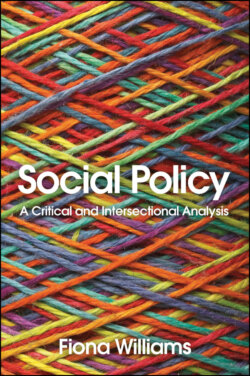Social Policy

Реклама. ООО «ЛитРес», ИНН: 7719571260.
Оглавление
Fiona Williams. Social Policy
CONTENTS
Guide
List of Illustrations
List of Tables
Pages
Social Policy. A Critical and Intersectional Analysis
Acknowledgements
A Note on Terminology
1 Introduction
Continuities and changes
Structure of the book
Notes
2 A Critical and Intersectional Approach to Social Policy. Introduction
Remarginalization of the social
An intersectional approach for social policy
A critical approach to social policy
Conclusion
Notes
3 Intersecting Global Crises and Dynamics of Family, Nation, Work and Nature: A Framework for Analysis. Introduction
Neoliberalism, welfare and austerity
Frame 1: Intersecting global crises ‘Crisis’ – a note
The global financial crisis
The crisis of social reproduction and care
The crisis of climate change and ecology
The racialized crisis of borders
Intersections of colliding crises
Frame 2: The intersections of family, nation, work and nature
Conclusion
Notes
4 Unsettling/Settling Family–Nation–Work–Nature: From Austerity to Pandemic. Introduction
1: Work, family and nation: the depletion and devaluation of care
Parenting: responsibilization and blame
Binaries of blame
Troubling families
Responsible choices
The depletion and devaluation of care
Subordinating care to paid work
Diminishing children’s rights to wellbeing
Markets and the depletion and devaluation of care
Women and austerity: intersecting inequalities of ‘race’, gender and poverty
Diversity, inequalities and nation
2: Bordering practices in the post-racial
Post-racial settling
Bordering practices
Two sides of the same coin
Social abjection and necropolitics
The Windrush betrayal
3: Necropolitics, nation and nature
Grenfell Tower
Brexit nation
Nature and nation: the pandemic crisis
Not all risks are equal
Health and social care infrastructure
Challenges to the style and substance of governance
4: Not all of a piece
Conclusion
Notes
5 The Social Relations of Welfare: Subjects, Agents, Activists. Introduction
The turn to agency
The dynamics of agency
Agency as relational
The psychosocial dynamics of agency
Relating agency to action
Agency in the social relations of welfare
Logics of contestation and resistance
Spaces of power
Campaigning through spaces of power
Structures of feeling
Subjects of value
Conclusion
Notes
6 Intersections in the Transnational, Social and Political Economy of Care. Introduction
A story of changes and continuities
Micro-intersections layered in close encounters
Institutional intersections at the meso-scale
The transnational political and social economy of care
The transnational movement of care labour
The transnational dynamics of care commitments
The transnational expansion of care capital
Transnational political actors
Conclusion: towards care-ethical global justice
Notes
7 Towards an Eco-Welfare Commons: Intersections of Political Ethics and Prefigurative Practices. Introduction
Ethics grounded in the struggles of care, the environment and decoloniality
Political ethics of care
Environmental ethics
Being human as praxis: political ethics and decoloniality
Translating ethics into practical eco-social politics
Relationality 1: Care and connection
Relationality 2: Scales of possibility
Relationality 3: Intersectional dialogues and alliances
Towards the eco-welfare commons
Conclusion
Notes
8 Conclusion: Multidimensional Thinking for Social Policy. Introduction
Reconstituting the knowledge base of social policy
Relational knowledge and practices
Reconstruction and reimagination in post-Covid-19 futures
Notes
Appendix I: Elaborating Family–Nation–Work–Nature and Welfare
Appendix II: Situating the Author in Social Policy
Notes
References
Index. A
B
C
D
E
F
G
H
I
J
K
L
M
N
O
P
Q
R
S
T
U
V
W
X
Y
Z
POLITY END USER LICENSE AGREEMENT
Отрывок из книги
FIONA WILLIAMS
A source of intellectual stimulation was my association as advisor with Ito Peng’s international project Gender, Migration and the World of Care and Jenny Phillimore’s cross-national Welfare Bricolage project. I thank the Compass zoom discussion groups for rich debate on political strategies and activism.
.....
Political economy approaches which are relevant to social policy have themselves been refined over time. For example a ‘cultural political economy’ approach (Jessop 2013, 2015; Jensen and Tyler 2015) takes neoliberal austerity as a governmental project and looks at the changing realities and imaginaries of the ways the political and economic intersect in both capitalist social relations and capitalist accumulation processes. In other words, analysis of political economy is informed by an understanding of social and cultural relations. This is not just about social expenditure cuts but also about the means by which governments extend the very meaning of capital accumulation into the commodification and financialization of everyday life (Jessop 2015: 98). Similarly, John Clarke and Janet Newman’s (Clarke and Newman 2012, 2017; Clarke 2019a) understanding of austerity is informed by a ‘conjunctural’ approach developed from the analysis by Stuart Hall and the Centre for Contemporary Cultural Studies of Margaret Thatcher’s ‘authoritarian populism’ in the 1980s (Hall et al. 1978). Importantly, too, Ian Gough develops a political economy of climate change and welfare which situates the environment centrally in the future of social policy (Gough 2017).
A critical approach questions the taken for granted in mainstream thinking – in this case, mainstream social policy. By ‘mainstream’ I refer to those bodies of work that establish theoretical or methodological ‘cores’ for the discipline and shape its subsequent research. Like disciplines, cores vary over time and place, but social policy literature reviews (e.g. Starke 2006), journal content analysis (e.g. Powell 2006) and disciplinary texts demonstrate the development of ‘cores’. While I use the heuristic device of distinguishing between ‘critical’ and ‘mainstream’ social policy, it will also be clear that the boundaries between the two have shifted over time and have been quite porous. In some countries, social policy exists not as a discipline but as a subsection of sociology, political science, political economy or economics which studies state and non-state welfare policies. Historically, at least in the UK, social policy has been associated with its social reforming origins and the development of European modernity. This means that, as the first section of the chapter showed, the hierarchies, exclusions and otherness associated with European modernity underpin the discipline’s theoretical development, even though, by its very subject matter, issues of equality and social justice run through its veins. Here, the crucial and central question becomes what and who is included in the ‘social’ of social policy and social justice, and this is one of the questions that the book explores.
.....